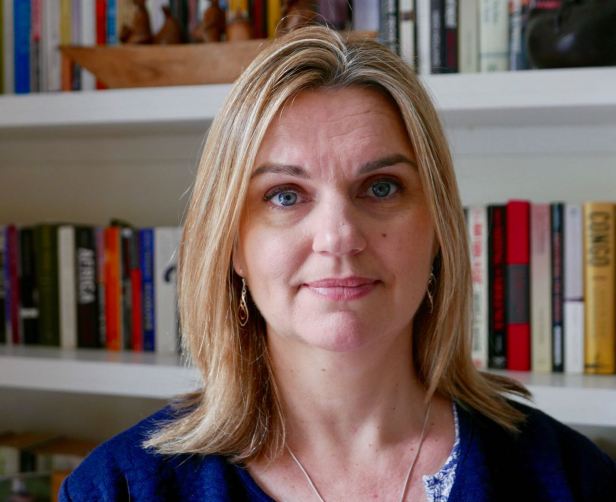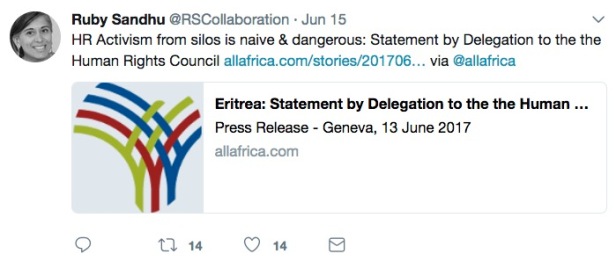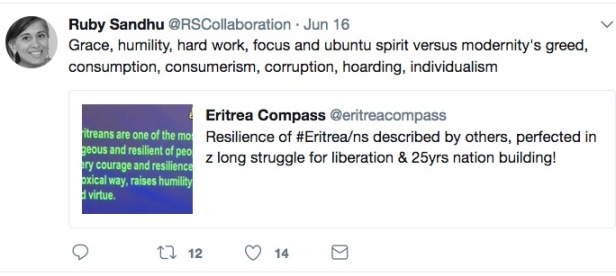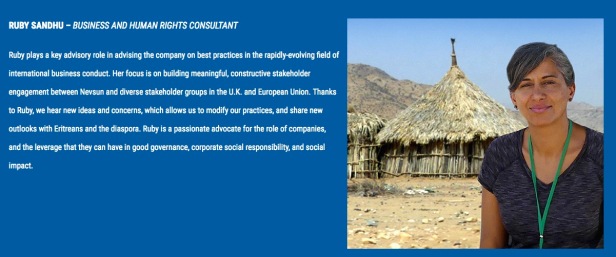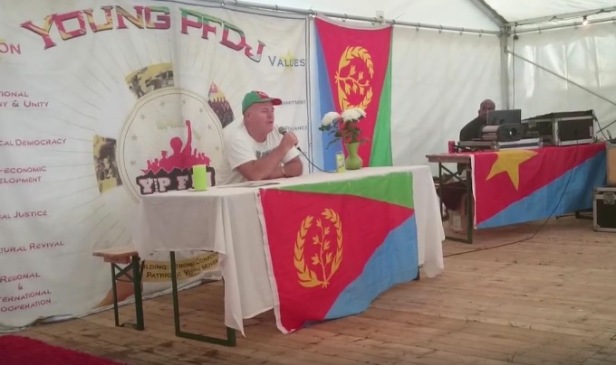Yesterday I published a report by Human Rights Watch on this subject. Today there is another horrifying report - this time by Associated Press.
Ali Awad Habib, a businessman who was detained in the city of Aden, described how he was given electrical shocks on his neck, back, chin and “sensitive parts” of his body, after being imprisoned by the Security Belt, another Yemeni force created by the UAE. His father, arrested with him in April 2016, was sent to the Emirati base in the Eritrean port of Assab.
Multiple former detainees said their biggest terror was the Emirati interrogators — like the one known only as “the Doctor.”
Martin
Inside Yemen’s secret prisons: ‘We could hear the screams’

MUKALLA, Yemen (AP) — They call it the “grill”: The victim is tied to a spit like a roast and spun furiously within a circle of fire. It is just one of the terrors inflicted by interrogators on detainees in Yemen who are routinely beaten with wires, kept in filthy shipping containers, and blindfolded for months — all by one of America’s closest counterterrorism allies.
Abuse and torture are routine in a network of secret prisons across southern Yemen where hundreds are detained in the hunt for al-Qaida militants, an Associated Press investigation has found. The network is run by the United Arab Emirates and by Yemeni forces it created, with at least 18 lock-ups hidden away in military bases, air and seaports, the basements of private villas and even a nightclub, according to accounts from former detainees, families of prisoners, civil rights lawyers and Yemeni military officials.

The United Arab Emirates and Yemeni forces run a secret network of prisons

American defense officials confirmed Wednesday that U.S. forces have interrogated some detainees in Yemen but denied any participation in or knowledge of human rights abuses. The American officials confirmed that the U.S. provides questions to the Emiratis and receives transcripts of their interrogations. A Yemeni witness of American interrogations also told the AP that no torture took place during those sessions where he was present.
Still, the American role raises potential concerns about violations of international law. Obtaining intelligence that may have been extracted by torture inflicted by another party would violate the International Convention Against Torture, which prohibits complicity, said Ryan Goodman, a law professor at New York University who served as special counsel to the Defense Department until last year.
Some prisoners have also been transported out of Yemen to a remote Emirati base across the Red Sea in Eritrea, according to Yemeni Interior Minister Hussein Arab and others.
https://interactives.ap.org/yemen-prison/?SITEID=APNEWS
Washington has long relied on allies to help it gain intelligence in the fight against al-Qaida, and Yemen is a main theater for that fight, even while the country is mired in a 2-year-old civil war. The UAE has been so critical that Defense Secretary James Mattis praised it as “Little Sparta” for its outsized role against the militants. The UAE government in a statement to the AP denied that any secret prisons exist or that torture takes place.
Yet at one main detention complex at Riyan airport in the southern Yemeni city of Mukalla, former inmates described being crammed into shipping containers smeared with feces and blindfolded for weeks on end. They said they were beaten, rotated on a spit and sexually assaulted, among other abuse. A member of the Hadramawt Elite, a Yemeni security force set up by the UAE, spoke to the AP on condition of anonymity to discuss the workings at the base. He said American forces were at times only yards away.
“We could hear the screams,” said a former detainee held for six months at Riyan. “The entire place is gripped by fear. Almost everyone is sick, the rest are near death. Anyone who complains heads directly to the torture chamber.” He was flogged with wires regularly and said he was inside a metal shipping container when the guards lit a fire underneath to fill it with smoke.
One fellow inmate tried to slit his own throat; another tried to hang himself, he said. He was interviewed in person by the AP after his release from detention.
He and the other former detainees spoke on condition of anonymity for fear of being arrested again. They said that when they were released, Emirati officers forced them to sign a document not to talk publicly about what they had endured.
“When I left the container, it was like escaping death,” he said.
The Associated Press interviewed 10 former prisoners, as well as a dozen officials in the Yemeni government, military and security services and nearly 20 relatives of detainees.
Ali Awad Habib, a businessman who was detained in the city of Aden, described how he was given electrical shocks on his neck, back, chin and “sensitive parts” of his body, after being imprisoned by the Security Belt, another Yemeni force created by the UAE. His father, arrested with him in April 2016, was sent to the Emirati base in the Eritrean port of Assab.
Multiple former detainees said their biggest terror was the Emirati interrogators — like the one known only as “the Doctor.”
GRILLED ON A SPIT
The guards would bang on the metal doors of the shipping containers, shouting that “the Doctor” had arrived. The prisoners inside, blindfolded and bound, didn’t know his real name: They knew only his Emirati accent as he asked questions and inflicted pain.
One of his torments was to hang weights on an inmate’s genitals and pull. Another former detainee described being put on “the grill”: Blindfolded, he was tied to a horizontal pole inside a circle of flame. He said he was spun so fast that he vomited blood.
All six former inmates from Riyan, each interviewed separately by the AP, said they were beaten with wires, often by the Doctor himself. One detainee told of undergoing a fake execution where he was dressed in what he was told was an explosive suicide belt, then a sound grenade was set off near him.

This Yemeni man says his son was detained and has since disappeared.
Riyan was once Mukalla’s commercial airport but has been turned into a coalition base.
There, detainees were initially crammed by the dozens into a hangar and into 3-by-10 meter shipping containers, according to the six former inmates. The detainees were kept blindfolded, their legs and hands bound for months on end.
“Imagine having your eyes covered for 100 days, you feel like you’re the walking dead,” said the ex-inmate who was there for six months. He was allowed to care for his fellow detainees and came to know many.
Food was scarce, diarrhea was rife; access to toilets was limited and the containers reeked, he said. Emirati officers would hold their noses from the stench, he and other detainees said. Emirati officers interrogated the detainees at Riyan, while members of the Hadramawt Elite served as guards.
Mukalla, the capital of Hadramawt province, is a major focus in the fight against al-Qaida by the UAE and the Hadramawt Elite.
Overlooking the Arabian Sea, the city was overrun by al-Qaida in 2015. Militants dominated the city for around a year until they fled before a planned assault by the Hadramawt Elite. During the militant’s rule, many residents worked in service jobs for al-Qaida or otherwise had to deal with the group to get by — and that appears to have made some of them targets for arrest now.
For the past year, the Hadramawt Elite has arrested suspected al-Qaida members in Mukalla and surrounding areas. So far, more than 400 men have been rounded up, according to Sheikh Saleh al-Sharafi, a chief mediator between the Emiratis and the families of the detainees.
A Yemeni who served at Riyan said that men dressed in civilian clothes who his Emirati superiors said were Americans started showing up for the interrogations more than a year ago.
During those sessions, the detainees were not abused, he said. A team of three Americans in civilian clothes came to the base, sometimes multiple times a week, staying for up to three or four hours each time, he said. He asked to remain unnamed because he was not authorized to discuss his work.
The Yemeni said he used to bring detainees to the room where Americans were present. He watched interrogations and saw Emirati officials asking the questions and translating the answers to the Americans.

18 secret prisons in Yemen controlled by the United Arab Emirates
Several inmates said guards frequently threatened prisoners by saying they would “take them to the ships.”
Senior U.S. defense officials flatly denied the U.S. military conducts any interrogations of Yemenis on any ships.
“We have no comment on these specific claims,” added Jonathan Liu, a CIA spokesman.
But a Yemeni officer told AP he had worked on a vessel off the coast where he saw at least two detainees brought for questioning.
He said the detainees were taken below deck, where he was told American “polygraph experts” and “psychological experts” conducted interrogations. He did not have access to the lower decks and thus had no first-hand information about what happened there. But he said he saw other Americans in uniforms on the ship. The officer spoke on condition of anonymity because he feared retaliation for discussing the operations.
A second Yemeni officer said he was involved in moving detainees to a ship, where he said he saw foreigners though he didn’t know their nationality. “They say these are the important ones. Why are they important? I have no idea,” he said of the detainees.
A top official in Hadi’s Interior Ministry and a senior military official in the 1st Military District, based in Hadramawt, also contended that Americans were conducting interrogations at sea, as did a former senior security official in Hadramawt. The three men spoke to the AP on condition of anonymity because they were not authorized to share military information.
Yemeni Brig. Gen. Farag Salem al-Bahsani, commander of the Mukalla-based 2nd Military District, said reports of torture are “exaggerated.” He denied any detainees were “transferred to the Americans” but said the U.S. sent questions to interrogators and received reports on the results. They also gave coalition authorities a list of most wanted men, including many who were later arrested.
Former prisoners said the abuses in Riyan were constant.
Every night, the guards stormed the containers, forced everyone to lie on their bellies and beat them, all six detainees said. The ex-detainee who gave help to other prisoners recalled seeing one whose trousers were drenched in blood. Several told the ex-detainee that they had been sexually assaulted.
Others “lost their minds,” he said, adding he witnessed two suicide attempts. One tried to strangle himself with his own handcuffs. Another smashed a jelly jar and sliced his own throat. He said a detainee lost his sight because guards intentionally hit him in the face after he told them he’d had eye surgery before his arrest.
Another ex-detainee showed the AP how he was bound hand and foot and blindfolded. He said he was held at Riyan for nearly six months and subjected to constant beatings, though he was questioned only once, about a distant relative.
“I would die and go to hell rather than go back to this prison,” he said. “They wouldn’t treat animals this way. If it was bin Laden, they wouldn’t do this.”
“LITTLE SPARTA”
The small but wealthy Gulf state of the Emirates, a longtime intelligence partner of the U.S., has muscled into a powerful role in Yemen.
The UAE is part of a Saudi-led, U.S.-backed coalition fighting in support of Yemen’s government against Shiite rebels known as Houthis, who overran the north of the country. The 2-year-old civil war has pushed the already impoverished nation into near famine in some areas.
The coalition is also fighting al-Qaida in the Arabian Peninsula, one of the most dangerous extremist groups in the world, as well as Islamic State militants in Yemen. The Pentagon has said it sent a small contingent of U.S. forces in Mukalla last year, largely in an intelligence sharing role, and that forces move in and out routinely.
Under the Trump administration, the U.S. has escalated drone strikes to more than 80 this year, up from 21 in 2016, according to U.S. Central Command. At least two raids were ordered against al-Qaida, including one in which a Navy SEAL was killed along with 25 civilians. On Thursday, CENTCOM reported that three al-Qaida militants had been killed in a U.S. airstrike.
Over the course of the civil war, the UAE has effectively carved out its own state-within-a-state in southern Yemen. It has set up an extensive security apparatus, created its own Yemeni militias and runs military bases. The result has undermined the internationally recognized government of President Abed Rabbo Mansour Hadi. Ostensibly, UAE-trained forces like the Hadramawt Elite and Security Belt are under Hadi’s government, but Hadi’s officials often complain that those forces answer only to the Emiratis.
The network of Emirati prisons echoes the so-called “black sites,” secret detention facilities set up by the CIA to interrogate terrorism suspects in the aftermath of the 9/11 attacks. In 2009, then-President Barack Obama disbanded the sites. The UAE network in war-torn Yemen was set up during the Obama administration and continues operating to this day.

Lists of people believed missing inside a secret prison.in Mukalla.
Chief Pentagon spokeswoman Dana White said the Defense Department has “found no credible evidence to substantiate that the U.S. is participating in any abuse.”
“We always adhere to the highest standards of personal and professional conduct,” she said when presented with AP’s findings. “We would not turn a blind eye, because we are obligated to report any violations of human rights.”
However, several U.S. defense officials said senior military leaders are aware of the allegations of torture at the prisons in Yemen and have looked into them. In the end, they were satisfied that there has not been any abuse when U.S. forces are present, the officials said. They weren’t authorized to speak publicly about sensitive military operations and requested anonymity.
The officials said members of the Pentagon’s Joint Special Operations Command or other military intelligence experts participate in interrogations of detainees at locations in Yemen. They said JSOC troops are trained to look for signs of abuses and are required to report it.
Legal experts said that in the light of alleged Emirati abuses, U.S. interrogations could constitute “complicity in torture,” which is banned in Article 4 of the U.N. Convention against Torture.
“It would therefore be unlawful for the U.S. to receive and/or rely on intelligence where the U.S. knows or should know that there was a real risk of the intelligence being obtained from torture,” said Amrit Singh, a senior legal officer at the Open Society Justice Initiative. “The U.S. has a positive obligation under international law to prevent torture instead of acquiescing in it.”
VANISHED
Families often gathered outside Riyan airport, trying to find news of detained loved ones.
One man in his 60s said his teenage son was seized in August and has not resurfaced since. He was told the teen was in Riyan but whenever he appealed for news from Yemeni officials, they told him, “This is in the hands of the Emiratis and the Americans.” He spoke on condition of anonymity for fear of reprisals against himself or his son.
In a nearby town, Mohammed al-Saadi’s brother Hani vanished in January, when 20 masked gunmen descended on his butcher shop in the middle of the day. They grabbed Hani, still wearing his bloody apron and holding pieces of meat, and dragged him away in front of bystanders, Mohammed said — “like he’s a gangster or leader of al-Qaida.”
Mohammed thinks the arrest may be because al-Qaida fighters frequented Hani’s shop when they ran the area. He was told that Hani is at Riyan prison by former inmates, but officials won’t confirm it.
“I asked Yemeni officials. All I was told was, ‘We can do nothing to the Emiratis,’” he said. “As if we are not in a state.”
The wave of arrests is also taking place in Aden and other areas.

Looking out over part of Aden Central Prison, known as Mansoura
Sabri al-Shormani, an engineer, said he was arrested a year ago by the UAE-backed Security Belt from his hometown outside Aden. He was held incommunicado for weeks and interrogated by masked men with Emirati accents about his brother, who was suspected of al-Qaida links.
“We came to serve you,” he said the Emirati interrogators told him.
He was put blindfolded in solitary confinement for a week, and he said the stress caused his face to become partially paralyzed. Eventually, they freed him because of his faltering health.
The Security Belt then arrested another of his brothers, Ali. The family had no idea where he was for five months until he was suddenly released on April 3, appearing on the family doorstep. But shortly after he was welcomed home with tears and hugs, a force of gunmen arrived at the house, brought him outside and shot him to death, said their 60-year-old father, Mohammed Jaafar.
“We heard heavy gunfire. We didn’t know what was happening, there were armed men lined up,” Jaafar said. “I saw them, I started to scream.” Sabri said that there were bruises and other marks of torture on his brother’s body.
Huda al-Sarari, a rights lawyer in Aden who tracks detentions and torture, contended that many innocents are caught up in the arrests. But even al-Qaida suspects should be detained and questioned legally, she said.
“His family should know his whereabouts. He should be tried,” she said. “How long should detainees stay in detention centers where there is no electricity, no care, because they fall outside the authorities’ control?”
Ali Awad Habib, the businessman who was tortured with electric shocks, still doesn’t know why he was imprisoned for 6 months.
“Shock, shock, shock,” he said, pointing to the places where he said interrogators used the electrical prod on him. “I was tortured for no reason.”
He was detained on April 21, 2016, when masked gunmen from the Security Belt stormed into his office and one of his family businesses, a sponge factory in Aden, Yemen’s second largest city. They beat up and took away Habib, his brother, father, uncle and cousins along with several workers.
Habib and most of the others were taken to Aden’s official prison, known as Mansoura, where one section is under control of the Security Belt.
There, during interrogations, he said he was often beaten by heavy wires. The accusations against him varied each time. “One says I am an al-Qaida member, a second says I’m a drug dealer, and a third said I am an Iranian agent,” he said.
Habib was freed only to discover that his father was taken to the Emirati base in Assab, Eritrea, where there has been no word of him.
Naquib al-Yahri, the head of Mansoura prison, said Habib’s father was sent to Assab on suspicion of selling weapons to al-Qaida. He said the coalition was taking other prisoners out of Yemen, but did not provide figures.
He denied any torture or illegal detentions at Mansoura, saying that prosecutors are questioning those held or have ordered them kept in custody until courts in the war-torn country are back functioning. He gave the AP a tour of part of the facility, showing newly renovated cells and workshops for prisoners under 18 years old to learn a trade. In front of guards, the AP spoke to five teenaged prisoners who said they were doing well.
Aden’s security chief, Shalal al-Shaya, dismissed reports of illegal detentions, secret prisons or torture. He said all raids by his forces — which he said were trained by the U.S., Jordan and UAE — are carried out legally.
And he’s not worried about where the prisoners wind up.
“They terrorized the world and I don’t care where they take them,” he said.
___
Associated Press writers Lolita Baldor and Desmond Butler in Washington and Ahmed al-Haj and Maad al-Zikry in Yemen contributed to this report.
Martin Plaut | 25/06/2017 at 8:49 am | Tags: Assab, Eritrea, Torture, UAE, Yemen | Categories: Africa, Eritrea, Horn of Africa, United Arab Emirates, Yemen | URL: http://wp.me/p1OD48-323
